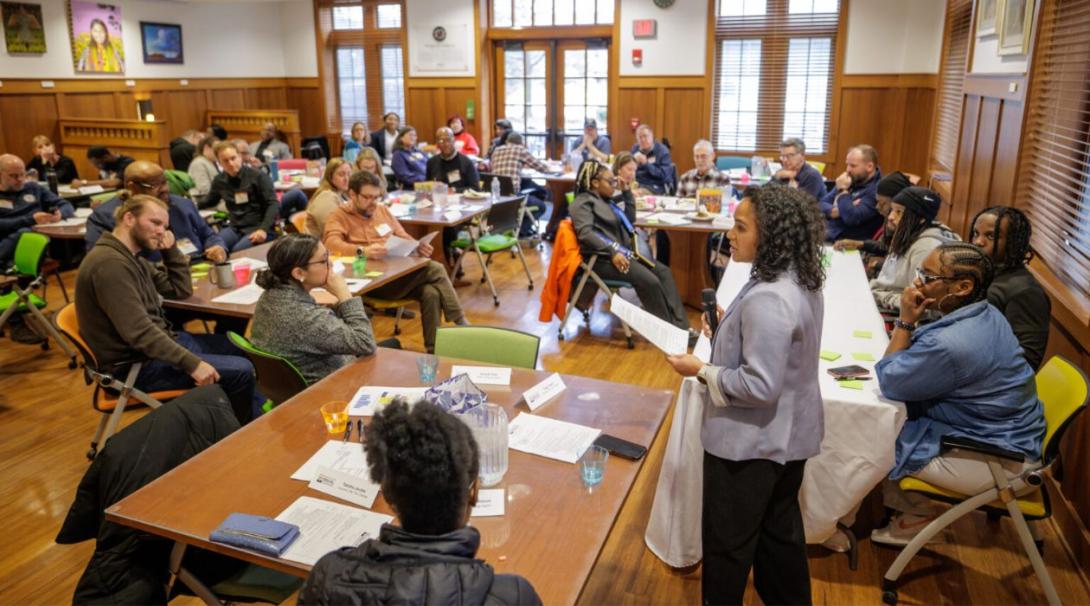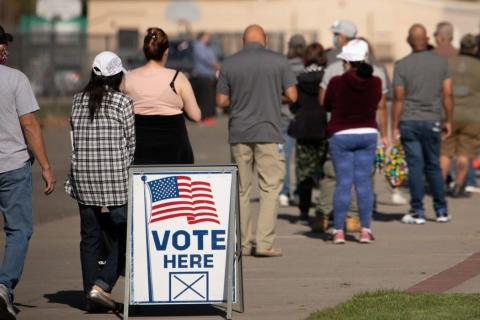
Photo by Institute for Social Concerns University of Notre Dame
I was at The University of Notre Dame last week for a special one-day gathering to discuss gun violence in the U.S. Participants included a theologian and professor, nonprofit leaders and consultants, two evangelical faith and justice activists, a Catholic priest and author, and public speakers on important topics of faith in the public square.
The overriding theme was, “How do we think about gun violence as right-to-life Christians?” Most significant to me was how, by day’s end, we came to consensus around attention to the Gospel.
Our convener was Alexei Laushkin, a Christian strategist with a broad ecumenical reach. Alexei is the founder of Kingdom Mission Society, a non-profit evangelical ministry located in Falls Church, Virginia. Their mission is first and foremost, in Alexei’s words, “seeing Christ at work in others.”
Gun violence is about many things: for instance, relationships between couples, especially women who are threatened by men. The number one cause of death for pregnant women is homicide, and most of those murders come at the hand of a gun. This demonstrates also the impact gun violence has on unborn children—that’s where we began our conversations. And to be fair to legal gun owners, statistics overwhelmingly demonstrate that this violence is usually wrought by illegal possessors of firearms.
Most striking to me, was how, after five hours of conversations (halfway through our day together), we realized we were able to find points of agreement that are meaningful and hopeful for the future.
Illegal gun acquisition is a major problem. Mexican cartels have millions of guns, none of which are acquired lawfully. On the flipside, Chicagoans drive to northern Indiana every week to purchase weapons legally from gun dealers, only to drive them back to Chicago where they’re sold at a great mark-up to Chicago gang members, who value new guns that are not yet connected to crimes in police databases.
Now, we didn’t need a symposium to realize that gunfire on school grounds has seen a sharp increase. But the numbers were still startling. The number of school shootings annually has risen steadily from the 20s in the late 1990s to the 300s the last few years in the U.S.
When the topic of arming teachers came up, an activist who is the mother of a school shooting survivor became a voice in opposition. Her child’s teacher was able to lock the kids inside a classroom as a shooter roamed the halls with an AR-15-style assault weapon, but the teacher’s hand shook so violently that she couldn’t manage to close the window shade to the room; so now the kids remember the killer’s face. “Teachers are not trained to carry and use guns. Most of them don’t want that, either,” she said.
A lawyer who works with a non-profit on gun violence matters talked about the accessibility of weapons and the problems this can cause. He referred to “the gun in the nightstand,” which may never be misused but its access creates opportunity when circumstances in the room, or in the house, change. The fact that the firearm is available then creates the opportunity for its use. So the gun is not the cause of the violence, but it is its instrument. He offered: “If you knew that your teenager was going through a terrible stage of their life, and had access to a gun, you would take that gun away.”
Not everyone in our gathering was “anti-gun.” We had one person outspoken in favor of gun rights who also, for instance, didn’t believe banning assault rifles, a frequent cause of the USCCB, is the best way forward. He did, however, praise the bishops’ emphasis on the mental health component on gun violence, saying that we need to talk more about that. And he stated the obvious: “No one is in favor of gun violence.” There are good people, faithful Christians, who own and use guns.
Most striking to me, was how, after five hours of conversations (halfway through our day together), we paused to realize we were all able to find points of agreement that are meaningful and hopeful for the future. First, we need more resources and support for mental health in our churches. Second, we need a greater emphasis on personal responsibility around gun use and ownership. Third, the gun laws we already have are too rarely enforced. Fourth, we will do this better going forward if we can learn from each other.
[A fuller report from “A Catholic Symposium on Gun Violence” will appear in the May-June issue of the print magazine.]












